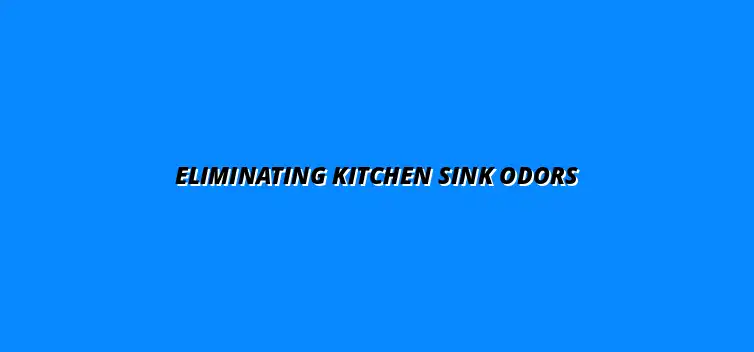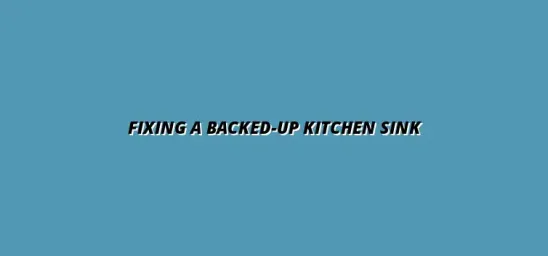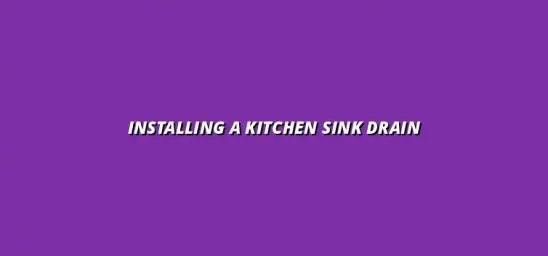
Eliminating Kitchen Sink Odors
Understanding Kitchen Sink Odors Linked to Plumbing Issues
Kitchen sink odors can be more than just a nuisance; they can signal underlying plumbing problems that need immediate attention. Understanding the causes of these unpleasant smells is crucial for maintaining a healthy kitchen environment. Let's dive into some common culprits that might be affecting your sink's aroma!
Common Causes of Unpleasant Kitchen Sink Smells
There are several reasons why your kitchen sink might be emitting unpleasant odors. Identifying these causes can help you find effective solutions. Here are some of the most common reasons for those unwanted smells:
- Clogged drains
- Food waste buildup
- Dry P-traps
Clogged Drains and Their Impact on Odors
One of the primary reasons for kitchen sink odors is clogged drains. When food particles, grease, and other debris accumulate in the pipes, they create a breeding ground for bacteria. This buildup can lead to foul smells that waft up through the sink and into your kitchen. To avoid clogged drains, it’s essential to regularly clean your sink and dispose of food waste properly. For specific tips on fixing a clogged kitchen sink, check out this helpful guide: fixing a clogged kitchen sink.
A simple *preventative measure* includes running hot water down the drain after each use. This helps to flush away any lingering residue!
Role of Food Waste Buildup in Kitchen Sink Odors
Food waste can be a major source of odors in your kitchen sink. Even small bits of food that get caught in the drain can decay and produce unpleasant smells. Over time, this buildup can worsen, causing even more intense odors. Learning how to prevent kitchen sink blockages easily is key to maintaining a fresh-smelling kitchen.
To mitigate these smells, consider using a drain strainer to catch food particles before they enter the drain. This simple tool can help reduce waste and keep your sink smelling fresh!
The Effect of Dry P-Traps on Sinks
Another common source of kitchen sink odors is a dry P-trap. The P-trap is a plumbing fixture designed to hold water, creating a barrier that prevents sewer gases from entering your home. If the P-trap dries out, these gases can escape, leading to foul odors. For natural ways to keep your drains clean and prevent blockages, consider these natural ways to clean drains.
Make sure to run water through your sink regularly, especially if it’s not used often. This ensures that the P-trap remains filled and continues to do its job of blocking those unwanted smells.
Identifying Plumbing-Related Odor Signs
Recognizing the signs of plumbing-related odors can help you act swiftly. Addressing these issues early can prevent bigger problems down the line. Here are some common indicators that your kitchen might have plumbing issues:
- Foul smells emanating from the sink
- Gurgling noises when draining
- Slow drainage or pooling water
Common Indicators of Plumbing Problems
When you notice strange or persistent odors, it often points to plumbing problems. Paying attention to these signs can help you catch issues early. If you hear gurgling noises or notice slow draining, these could be signs of a blockage or venting issue in your plumbing system. Understanding the causes and fixes for kitchen drain blockages can be very helpful, see this article on kitchen drain blockages.
Being proactive by inspecting your sink regularly can lead to better outcomes. Keeping an eye on these indicators can help you maintain a fresh kitchen environment!
When to Seek Professional Help for Persistent Odors
If you’ve tried to address odors but they persist, it may be time to call in a professional. Persistent smells can sometimes indicate more serious plumbing issues that need expert attention. Ignoring these problems can lead to costly repairs down the line. For plumbing emergencies in Deritend, Birmingham, you can find a reliable plumber in Deritend, Birmingham.
Don't hesitate to reach out if the odors continue despite your efforts. A professional plumber can provide a thorough assessment and recommend effective solutions.
Addressing Frequently Asked Questions on Kitchen Sink Odors
How Can I Tell if My Kitchen Sink Odor is Plumbing Related?
Identifying if the odor from your kitchen sink is plumbing related can save you a lot of hassle. Generally, if you notice a foul smell that seems to get worse over time, it might be linked to a plumbing issue. Pay attention to when the odor is strongest—if it intensifies after using the sink, it’s likely a plumbing problem.
Some *common signs* to look out for include:
- Persistent odors that return after cleaning.
- Smells that differ when the faucet is running versus when it’s off.
- Gurgling sounds or slow drainage, which indicates clogs.
If you notice these signs, it’s a good idea to investigate further. Sometimes, the solution can be as simple as cleaning the drain, while other times, you may need professional help. If you are experiencing a leaky kitchen sink, you can find advice on repairing a leaky kitchen sink.
What Are the Long-Term Consequences of Ignoring Kitchen Sink Odors?
Ignoring kitchen sink odors can lead to more serious plumbing issues down the line. Over time, the problems causing the odors can worsen, leading to clogs, leaks, or even pipe damage. Additionally, unpleasant odors often indicate an underlying issue that could pose health risks, such as mold or bacteria growth.
Here are some *potential long-term consequences* of ignoring these odors:
- Severe clogs requiring costly plumbing repairs.
- Water damage from leaks or broken pipes.
- Health issues due to mold or bacteria exposure.
Taking action when you first notice kitchen sink odors can help you avoid these lasting issues. Regular checks and maintenance can keep your plumbing in good shape and your kitchen smelling fresh!
Are Chemical Drain Cleaners Safe for Long-Term Use?
Chemical drain cleaners can be effective for clearing clogs, but they aren’t always the best option for long-term use. Many of these products contain harsh chemicals that can damage your plumbing over time. Additionally, they can be harmful to the environment and pose health risks if not used properly. Avoiding mistakes in water heater maintenance can also prevent future plumbing problems, read more about water heater maintenance mistakes.
Consider these *important points* before using chemical drain cleaners:
- They may corrode pipes, especially older ones.
- Repeated use can lead to more severe plumbing issues.
- Non-toxic alternatives are often available and safer for regular use.
If you find yourself frequently relying on chemical cleaners, it may be time to investigate the root cause of your plumbing issues. Seeking professional plumbing advice can lead to more sustainable solutions.
Final Thoughts on Managing Kitchen Sink Odors Caused by Plumbing Issues
Summarizing Key Takeaways for Odor Management
Managing kitchen sink odors is essential for a pleasant cooking environment and overall home health. By understanding the common causes and signs of plumbing-related odors, you can take the right steps toward addressing them. Regular maintenance and prompt action can prevent minor issues from escalating into major problems.
Remember these *key takeaways*:
- Keep an eye on any persistent or unusual odors.
- Practice regular cleaning and maintenance of your sink and plumbing.
- Consult professionals when problems seem beyond simple remedies.
With these strategies, you can keep your kitchen fresh and functional!
Encouraging Regular Plumbing Inspections and Maintenance
Regular plumbing inspections are crucial in preventing kitchen sink odors and other plumbing issues. Scheduling inspections allows professionals to catch problems before they lead to bad smells or worse. Many homeowners overlook the importance of these checks, but they can save time and money in the long term.
Consider these *benefits of regular plumbing inspections*:
- Early detection of potential plumbing issues.
- Improved overall plumbing health.
- Peace of mind knowing your plumbing is in good shape.
By prioritizing regular maintenance, you can ensure your kitchen remains a pleasant space to cook and gather. Don’t wait for problems to arise; take proactive steps today!





Fixing a Backed-Up Kitchen Sink
Prepare Your Plumbing for Weather
Installing a Kitchen Sink Drain
When to Replace Plumbing Fixtures
Fixing a Jammed Garbage Disposal